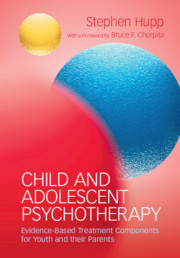Description
Child and Adolescent Psychotherapy
Components of Evidence-Based Treatments for Youth and their Parents
Coordinator: Hupp Stephen
Prefaced by: Chorpita Bruce F.
This text covers the evidence-based approaches for the most critical mental health issues facing youth, from infancy through adolescence.
Language: English
Subject for Child and Adolescent Psychotherapy:
Child and Adolescent Psychotherapy
Publication date: 09-2018
374 p. · 17.8x25.4 cm · Paperback
Publication date: 09-2018
374 p. · 17.8x25.4 cm · Paperback
Child and Adolescent Psychotherapy
Publication date: 09-2018
374 p. · 18.2x26.1 cm · Hardback
Publication date: 09-2018
374 p. · 18.2x26.1 cm · Hardback
Description
/li>Contents
/li>Biography
/li>
Every day, millions of children experience serious mental health issues, such as symptoms related to autism, psychosis, mania, depression, and anxiety. Moreover, many youth struggle with issues related to trauma, eating, sleep, disruptive behavior, and substance use. Most of these youth do not receive evidence-based treatments. Instead, they commonly receive untested, ineffective, and even harmful treatments. Child and Adolescent Psychotherapy presents the research-supported treatment packages and their individual components for every major mental health issue facing infants, children, and adolescents. Each chapter also identifies and analyzes other variables and resources that influence treatment: parents, assessment, comorbidity, demographics and medication. Useful resources are included for each mental health issued covered in the book. The chapters are organized in the same order as they appear in the DSM-5.
Preface; Foreword Bruce F. Chorpita; 1. The science of psychotherapy with youth Stephen Hupp, Fiona Macphee and William Pelham; 2. Intellectual and adaptive functioning Jessica F. Scherr, Elizabeth M. Kryszak and James A. Mulick; 3. Autism spectrum Elizabeth M. Kryszak, Jessica F. Scherr and James A. Mulick; 4. Inattention and hyperactivity Michael C. Meinzer, Christina M. Danko, Danielle R. Novick, John Vasko and Andrea Chronis-Tuscano; 5. Learning Mark Shriver; 6. Tics Brianna Wellen and Michael B. Himle; 7. Psychosis Sophie Browning, Anca Alba, Karen Bracegirdle and Suzanne Jolley; 8. Bipolar spectrum Sally Weinstein, Amy West and Ashley Isaia; 9. Depression Deepika Bose and Jeremy Pettit; 10. Anxiety Sarah Francis, Susan Doyle and Shannon Manley; 11. Obsessions and compulsions Dean McKay and Katherine Kennedy; 12. Attachment and trauma Monique LeBlanc, Megan Lilly, Whitney Rostad and Brittany Babycos; 13. Feeding Peter A. Girolami and John Borgen; 14. Eating Emily Stefano, Brooke Bennett, Frances Bozsik, Danae Hudson and Brooke Whisenhunt; 15. Toileting Michael I. Axelrod; 16. Sleep Bieke D. Puncochar and Sarah Morsbach Honaker; 17. Disruptive behavior and conduct Ann F. Garland; 18. Substance use Aaron Hogue, Molly Bobek, Tiffany John, Nicole Piazza and Jacqueline Fisher; 19. Therapy relationships and relational elements Stephen Shirk; 20. Closing the research to practice gap Amy Altszuler, Stephen Hupp and William Pelham.
Stephen Hupp is a Professor of Psychology in the Clinical Child and School Psychology program at Southern Illinois University, Edwardsville (SIUE). He is also a Licensed Clinical Psychologist and the Social-Emotional Consultant for the East St Louis Head Start Program. He is the author of over fifty scholarly publications, including three other books: Great Myths of Child Development (2015), Great Myths of Adolescence (forthcoming), and Critical Thinking about Child Development (fourth edition, forthcoming). In 2015, he won the Great Teacher Award from the SIUE Alumni Association, and he is an Executive Producer for the Science Moms documentary.
© 2024 LAVOISIER S.A.S.




